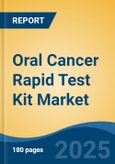Lab on Chip is the fastest growing segment, North America is the largest market globally
Speak directly to the analyst to clarify any post sales queries you may have.
10% Free customizationThis report comes with 10% free customization, enabling you to add data that meets your specific business needs.
Key Market Drivers
The escalating global incidence of oral cancer fundamentally drives the Oral Cancer Rapid Test Kit Market, necessitating accessible and efficient diagnostic tools. Early detection is critical for improving patient outcomes, as oral cancer often presents in advanced stages with poorer prognoses. For example, according to Cancer Research UK, in 2022, there were 389,846 new cases of mouth and oral cancer globally. This substantial annual caseload underscores the urgent need for widespread early screening. Rapid test kits are ideally positioned to meet this demand, enabling timely identification in diverse healthcare settings and facilitating prompt intervention. The rising global prevalence of oral cancer sustains the imperative for proactive screening measures that these rapid diagnostic solutions can effectively support.Key Market Challenges
The limited public and professional awareness regarding oral cancer risk factors, the importance of early detection, and the availability of rapid testing options significantly impedes the growth of the Global Oral Cancer Rapid Test Kit Market. This challenge directly restricts the adoption and utilization of these diagnostic tools. When both the general public and healthcare professionals lack comprehensive education on oral cancer's subtle initial signs and the critical benefits of early screening, the demand for rapid test kits remains subdued.Key Market Trends
The expansion of at-home testing solutions represents a pivotal trend, broadening access to oral cancer screening beyond traditional clinical settings. This trend addresses the demand for convenient diagnostic tools, empowering individuals to undertake preliminary screening privately and efficiently. For example, the U. S. Centers for Disease Control and Prevention reported that cancer screening rates declined by 15-20% since 2020, highlighting the substantial need for accessible home-based alternatives.Key Market Players Profiled:
- Abbott Laboratories Inc.
- Thermo Fisher Scientific Inc.
- F. Hoffmann-La Roche AG
- Beckman Coulter, Inc.
- Becton, Dickinson and Co.
- Bio-Rad Laboratories, Inc.
- Danaher Corp.
- GRAIL, LLC
- Henry Schein, Inc.
- Quest Diagnostics Inc.
- Quidel Corp.
- Siemens Healthineers AG
- Trinity Biotech plc
- Viome Life Sciences, Inc.
Report Scope:
In this report, the Global Oral Cancer Rapid Test Kit Market has been segmented into the following categories:By Type:
- Onc Alert Oral Cancer LAB
- Lab on Chip
- Insilixa Test
- Prevo- Check
By End user:
- Hospitals & Clinics
- Ambulatory Care Centers
- Others
By Region:
- North America
- Europe
- Asia Pacific
- South America
- Middle East & Africa
Competitive Landscape
Company Profiles: Detailed analysis of the major companies present in the Global Oral Cancer Rapid Test Kit Market.Available Customizations:
With the given market data, the publisher offers customizations according to a company's specific needs. The following customization options are available for the report:- Detailed analysis and profiling of additional market players (up to five).
This product will be delivered within 1-3 business days.
Table of Contents
Companies Mentioned
- Abbott Laboratories Inc.
- Thermo Fisher Scientific Inc.
- F. Hoffmann-La Roche AG
- Beckman Coulter, Inc.
- Becton, Dickinson and Co.
- Bio-Rad Laboratories, Inc.
- Danaher Corp.
- GRAIL, LLC
- Henry Schein, Inc.
- Quest Diagnostics Inc.
- Quidel Corp.
- Siemens Healthineers AG
- Trinity Biotech plc
- Viome Life Sciences, Inc.
Table Information
| Report Attribute | Details |
|---|---|
| No. of Pages | 180 |
| Published | November 2025 |
| Forecast Period | 2024 - 2030 |
| Estimated Market Value ( USD | $ 1.01 Billion |
| Forecasted Market Value ( USD | $ 1.3 Billion |
| Compound Annual Growth Rate | 4.3% |
| Regions Covered | Global |
| No. of Companies Mentioned | 14 |









